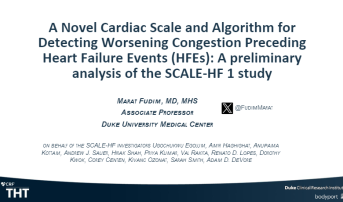Smart Scale Better at Predicting HF Events Than Weight-Based Monitoring
The device warrants further testing, but its congestion index appears better than current methods, with fewer physician alerts.

BOSTON, MA—A novel scale (Bodyport) equipped with an algorithm for detecting worsening congestion predicts twice as many HF events with fewer alerts than simply tracking body weight, according to new research presented at THT 2024 last week.
Compared with the weight-based rule of thumb for managing HF, the scale’s biomarker-based congestion index had greater sensitivity in predicting the unplanned administration of IV diuretics or hospital admission for HF, report investigators.
“Congestion is a long-term process, and we certainly want to rely on earlier signals, if we can, rather than late signals,” lead investigator Marat Fudim, MD, (Duke University, Durham, NC), told TCTMD. “Late signals, like weight gain, are still very reliable, but if you rely of weight gain and symptoms, you’re going to be late to the game.”
All HF patients are advised to weigh themselves daily, with increases of 3 pounds in a day or 5 pounds in a week reflective of worsening HF, but weight changes have not been shown to be associated with hospital admissions in prior studies. Beyond changes in weight, there are also more invasive measures, such as pulmonary-artery pressure monitors or implantable cardioverter-defibrillators, as well as wearable devices that can capture pathophysiologic changes earlier in the time course of decompensation.
“Right now, remote monitoring is really only given to the highest-risk patients,” said Fudim.
With SCALE-HF, investigators wanted to test a noninvasive solution for capturing worsening HF in 329 participants enrolled between 2021 and 2022. The provided scale captures several physiological measurements, including weight and impedance plethysmography, with a proprietary congestion index calculated based on the available parameters.
Late signals, like weight gain, are still very reliable, but if you rely of weight gain and symptoms, you’re going to be late to the game. Marat Fudim
The sensitivity of the fluid index—the number of correctly identified true HF events divided by the total number of events—was 0.70. Using changes in weight alone, sensitivity was 0.35. Importantly, the congestion index had an alert rate of 2.58 per patient-year compared with 4.13 alerts per patient-year using the weight-based approach.
“We had a lot less alerts,” said Fudim. “So that’s a key part because if the patient calls each time they have weight gain, they’d have called four or five times per year per patient when they meet those thresholds. With the scale, it’s two or three times per year, per patient.”
In terms of what’s next, Fudim said the device they tested is already approved by the US Food and Drug Administration. SCALE-HF 2 is currently in the works, with investigators attempting to prospectively validate some of the scale’s more advanced metrics, such as ballistocardiography, which captures mechanical heart function through the small forces exerted on the body with each contraction.
“In a perfect world, the next study after that would be SCALE-HF 3, which would be an outcomes study,” said Fudim. “Does it really make a difference in people staying out of the hospital if you use the scale and have people act on it? One important disclaimer is that [SCALE-HF 1] is an observational study. We looked at whether we can predict hospitalizations, but we didn't say that we can prevent them.”
Michael O’Riordan is the Managing Editor for TCTMD. He completed his undergraduate degrees at Queen’s University in Kingston, ON, and…
Read Full BioSources
Fudim M. A novel cardiac scale and algorithm for detecting worsening congestion preceding heart failure events: a preliminary analysis of the SCALE-HF 1 study. Presented at: THT 2024. March 6, 2024. Boston, MA.
Disclosures
- Fudim reports consulting for Bodyport, Boston Scientific, CVRx, Endotronix, Impulse Dynamics, VisCardia, scPharmaceuticals, and Cadence. He reports equity/options in Axon Therapeutics and Alleviant Medical.






Comments